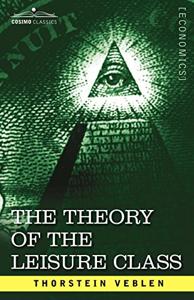
Want to learn the ideas in The Theory Of The Leisure Class better than ever? Read the world’s #1 book summary of The Theory Of The Leisure Class by Thorstein Veblen here.
Read a brief 1-Page Summary or watch video summaries curated by our expert team. Note: this book guide is not affiliated with or endorsed by the publisher or author, and we always encourage you to purchase and read the full book.
Video Summaries of The Theory Of The Leisure Class
We’ve scoured the Internet for the very best videos on The Theory Of The Leisure Class, from high-quality videos summaries to interviews or commentary by Thorstein Veblen.
1-Page Summary of The Theory Of The Leisure Class
Origins of a Leisure Class
In the past, the upper classes did not engage in industrial work. They belonged to a leisure class and regarded warfare and priesthood as honorable pursuits. The actual productive work was done by women and menials.
Civilizations have a social order that is based on the division of labor. In most societies, there are those who work and those who do not. The latter group has higher status than the former. These cultures are peaceful and friendly, unlike more warlike ones that rely on deceitful practices to get what they want.
When people become wealthy enough to have time on their hands, they may get bored and want something to do. Being wealthy can come from a society that is based on hunting or war. In this case, the men in the society are rewarded for being violent because it means they will be able to take over other groups and own their women as property.
In predatory societies, men do the work that is more honorable than women’s. They handle religious observance and battle, hunting and sports activities. These jobs are not productive; they’re only for consumption. Productive work is ignominious and shameful, to be avoided by those who pretend to dignity and honor.
Industrial work is done with objects, whereas nonindustrial work is done with people. Industrial employment involves creating something new. Nonindustrial jobs involve exploiting others’ labor, often as a means of appropriation. Males are more likely to be involved in nonindustrial jobs than females because they own their wives and daughters. However, women do engage in industrial work and can’t own anything that they produce since they’re considered property themselves. The origins of private property stem from the idea that men owned their wives and daughters as chattel or personal possessions who could not own anything themselves but were responsible for producing goods for them to appropriate.
Property and Status
Owning property shows how much status you have. The more property you own, the higher your social status is. Property ownership inspires people to fight for it or compete with others in order to get more of it, whether by force, fraud or some other means. Those who win are honored and those who emulate them are motivated to accumulate wealth because they want to be honored too.
People are not driven to amass wealth for subsistence, but rather as a way of being distinguished from others. They try to accumulate money and join the leisure-laden “nouveau rich” because they envy them. People want to copy those with lots of money, hoping that it will help them get honor and power in society. It is better to have a good reputation than secret treasure; you must be wealthy if you want people’s respect. Wealth is honorable – but only if it can be seen by others
Money determines what is fashionable, good taste, and culture. The more expensive an item is, the more beautiful or worthy it seems to be. For example, people may not want a lovely but inexpensive flower because they believe that cheap flowers are weeds while expensive ones are considered beautiful. Similarly, animals deemed most worthy are of little use; racehorses are accorded more dignity than workhorses. In addition to this idea of cost determining quality for women’s dress as well.
Display of Leisure
When people are motivated by greed, they will compete to be the best in their field. However, if you’re trying to achieve honor and status, then it’s not good to work hard because that means you’re inferior. This idea is rooted in ancient Greek philosophy when slaves did all of the labor while free men achieved honor through leisurely activities.





